Books
Books
in random order

Quiet Fires
Quiet Fires, the debut poetry collection from andriniki mattis, queries the everpresent questions of Black lives. Be it in a bakery in Brixton, London, at a corner on Malcolm X Blvd, Brooklyn, or the pews of Notre Dame, Paris – whether crossing violent borders on land or in gender, we know how it is to be in a familiar place that feels foreign.
As we follow along on bike rides over the Manhattan Bridge or sit alongside queer lovers in Bushwick, mattis reflects on the profound impact of pandemics, indifference, and heartbreak. In these lyrical and intimate poems that interrogate white spaces on the page and in the world with evocative metaphors, we wonder: “is there ever a party if you're always working this skin”— where can we feel safe and loved? In a world of climate change and the constant “twilight of violence”, be it gun violence or the expectations of capitalism, quiet fires erupt in these errant everyday moments. Centered around the experience of the Black queer, trans body, andriniki gabriel mattis uncovers the complexities of identity and the quest for self-discovery.


rosa rosa rosae rosae
Produced in conjunction with the exhibition that took place at Maison Pelgrims (10/9-23/10/2021), the book presents original interventions by the artists of the rosa rosae rosae project : Alicia Jeannin, Alicja Melzacka, Angela Detanico & Rafael Lain, Annaïk Lou Pitteloud, Audrey Cottin, buren, Charlie Usher, Eleanor Ivory Weber, Eva Giolo, Henry Andersen, Jan Vercruysse, Maíra Dietrich, Marc Buchy, Maxime Jean-Baptiste, Niels Poiz, Oriol Vilanova, Sabir (Lucie Guien, Amélie Derlon Cordina, Sophie Sénécaut / Perrine Estienne, Kevin Senant, Maud Marique, Pauline Allié, Carole Louis), Slow Reading Club, Sofia Caesar, Surya Ibrahim, Yiannis Papadopoulos, Yoann Van Parys
Edited by Pauline Hatzigeorgiou / SB34
Graphic design by Tipode Office
The book was produced with the support of Fédération Wallonie-Bruxelles (aide à l'édition) and Région Bruxelles-Capitale (Image de Bruxelles)
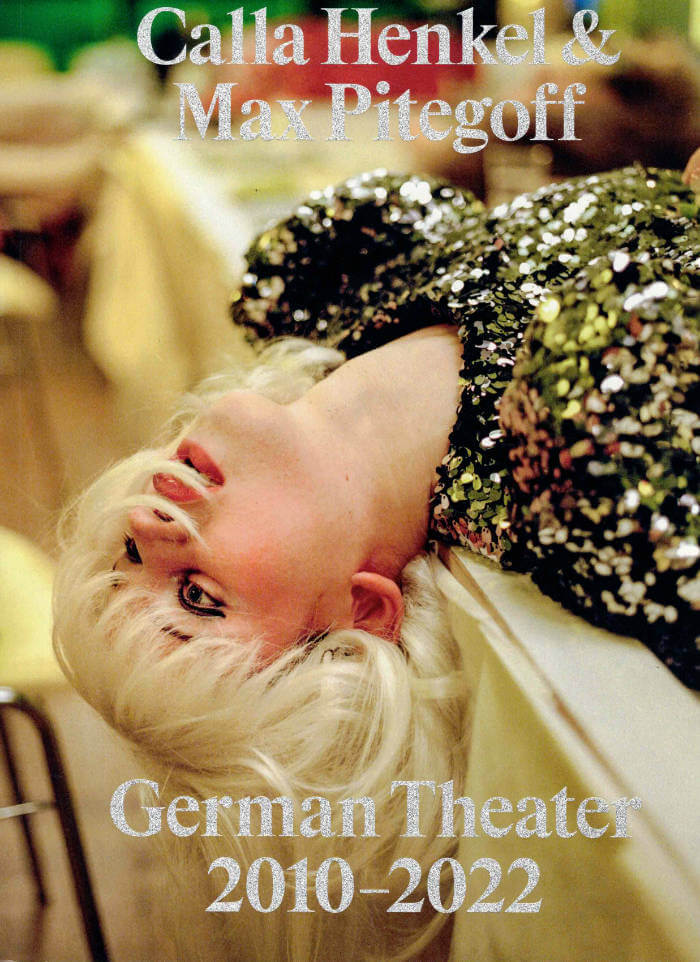
German Theater 2010–2022
Calla Henkel and Max Pitegoff: German Theater 2010–2022 is the first monograph on the work of the artist duo Calla Henkel (b. 1988, Minneapolis, MN) and Max Pitegoff (b. 1987, Buffalo, NY). Their manifold practices play out, live test, and fictionalize the mechanisms that shape creative communities. Chronicling over a decade of production in Berlin, the book is organized around the influential bar and theater spaces they ran there: Times Bar (2011–12), New Theater (2013–15), Grüner Salon at the Volksbühne (2017–18), and TV Bar (2019–22), and includes an interview with curator Fabrice Stroun and essays by David Bussel and Patrick Armstrong. Henkel and Pitegoff's photographs, plays, writing, and films address the complexity of collective action, painting a deadpan picture of the social and economic systems that sustain communal exchanges and their eminently fragile autonomy.
Edited by Fabrice Stroun
Design by Dan Solbach

Mélancolie Postcoloniale
Dans cet essai au verbe acéré, Paul Gilroy dénonce la pathologie néo-impérialiste des politiques mises en œuvre dans les pays occidentaux, sclérosés par les débats sur l’immigration, et propose en retour un modèle de société multiculturelle. De la création du concept de « race » à la formation des empires coloniaux, le sociologue britannique soulève quelques grandes questions de notre époque, et vise à faire émerger une réelle alternative aux récits édulcorés de notre passé colonial. En choisissant de mettre en avant la convivialité et le multiculturalisme indiscipliné du centre des grandes métropoles, Paul Gilroy défend une vision cosmopolite inclusive et plaide pour l’avènement d’une société qui refuse de céder aux discours de la peur et à la violence.
En examinant l’invention de catégories hiérarchisantes fondées sur la notion de race, et ses terribles conséquences, il démontre comment les écrits de penseurs tels que Frantz Fanon, W. E. B. Du Bois ou George Orwell peuvent encore faire avancer les réflexions sur le nationalisme, le postcolonialisme et les questions raciales. Mélancolie postcoloniale fait écho aux luttes postcoloniales d’aujourd’hui, en quête d’une pensée critique exigeante.
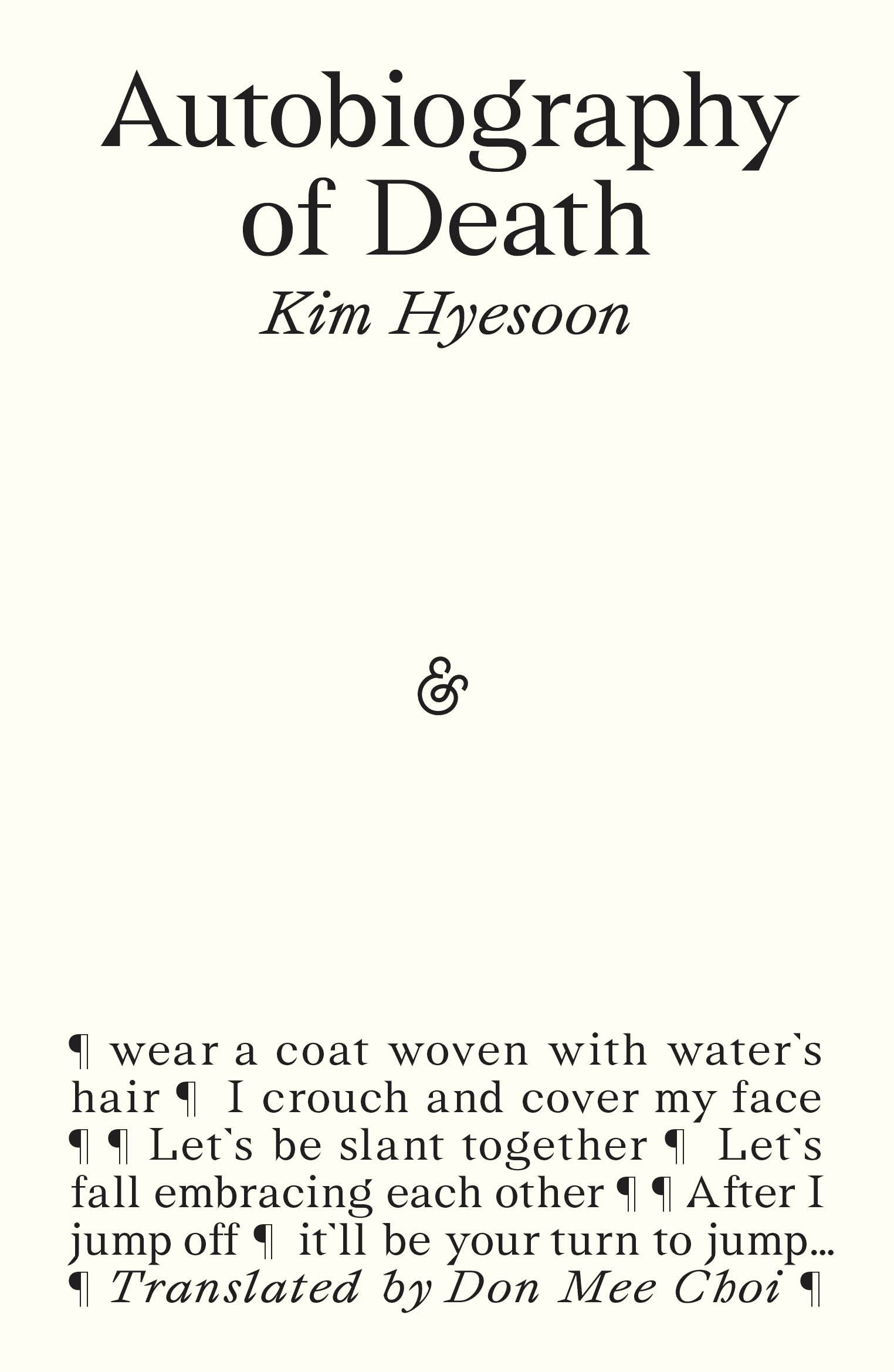
Autobiography of Death
‘I thought to myself that I needed to sing death, perform a rite for death, write death, then bid farewell to it. The way to send death away was to sing with my own death all the death in the sky and on the ground.’
The title section of Kim Hyesoon’s visceral Autobiography of Death consists of forty-nine poems, each poem representing a single day during which the spirit roams after death before it enters the cycle of reincarnation. The poems not only give voice to those who met unjust deaths during Korea’s violent contemporary history, but also unveil what Kim calls ‘the structure of death, that we remain living in’. Autobiography of Death at once re-enacts trauma and narrates death – how we die and how we survive within this cyclical structure. In this sea of mirrors, the plural ‘you’ speaks as a body of multitudes that has been beaten, bombed, and buried many times over by history. The volume concludes on the other side of the mirror with ‘Face of Rhythm’, a poem about individual pain, illness, and meditation.
Winner of the 2019 International Griffin Poetry Prize
Winner of the 2019 Lucien Stryk Asian Translation Prize

Black Revelry: In Honor of ‘The Sugar Shack’
An experiment in book making, which takes up the form of the LP record as a starting point for re-configuring the haptics of the printed book. Presented as a collection of unbound pages inside a gatefold record sleeve, the publication includes a pressed record, as well as written, visual and sonic contributions from scholars, poets, artists, choreographers and DJs.
Through the logic of the detail, each contributor imaginatively (re)produces Ernie Barnes’s iconic painting The Sugar Shack as an archive of personal histories and a universe of intergenerational connections. Held together as an album, it is a performance to be made at home, which invites readers/listeners to feel art’s histories and to be in them with their bodies.
d.a. carter with contributions by Taylor Renée Aldridge; Samiya Bashir; La Marr Jurelle Bruce; DJ Lynnée Denise, Jennifer Harge, Duane Lee Holland, Jr., William H. Mosley, III, Zoé Samudzi, S*an D. Henry-Smith, Melanie Stevens and Phillip B. Williams.

Theory, A Sunday
Louky Bersianik, Nicole Brossard and 4 more
Collectively authored by Louky Bersianik, Nicole Brossard, France Théoret, Gail Scott, Louise Cotnoir, Louise Dupré, Lisa Robertson, and Rachel Levitsky. Twenty-five years after its first French language publication, Theory, A Sunday (2013), a collaborative feminist poetics text, marks the first in Belladonna’s new Germinal Texts series. Written through Sunday meetings in Montreal, this volume gathers six women’s theoretical feminist texts, with a new introduction by Lisa Robertson and afterword by Gail Scott and Rachel Levitsky. Translators of this text include Erica Weitzman, Luise von Flotow, Popahna Brandes, and Nicole Peyrafitte.
Germinal Texts trace feminist avant-garde histories and the poetic lineages they produce. Focused on authors and texts that provide generative grounds for other writers and their work, Germinal Texts gesture to networks of affiliation, whether explicit or subterranean; to kinships and inheritances; to the unfolding of a text through its readership; and to always provisional origins without endings. Germinal Texts are works that gather dense histories and, for this reason, the series is designed to hold a space for critical discussion, with contextualizing front and back matter that launches new conversations.
Louky Bersianik (1930-2011) is the author of twelve books of poetry and prose. Essayist, novelist and poet, her much admired novel L’Eugélionne is considered Québec’s first feminist novel (translated by Howard Scott as The Eugélionne (1996). Her novel Permafrost, 1937-38, won the Governor General’s award in 1997. Louky was born in Montréal and studied at Université de Montréal, the Sorbonne, and Centre d’études de radio et de television.
Nicole Brossard was born in Montréal. Poet, novelist and essayist, she has published more than forty books. Her work has been influential on a generation of poets and feminists. Her work has been widely acknowledged and translated in many languages. Her most recent book, translated into English by Erin Mouré and Robert Majzels, is WHITE PIANO (Coach House Books, 2013). Nicole Brossard lives in Montréal.
Louise Cotnoir has published seventeen books of poetry, fiction and drama. She was twice nominated for the Governor General’s Award for Poetry, most recently for Les îles (2005). Dis-moi que j’imagine was a finalist for the prestigious Académie des lettres du Québec poetry prize (1996). She has participated in numerous conferences on women and writing, notably “Women and Words” (Vancouver, 1983), “L’écriture des femmes au Québec” (Sweden, 1992), “L’originalité de l’écriture au féminin au Québec” (New Jersey, 1995). She has contributed to or served on the editorial boards of Sorcières (Paris), Estuaire, Arcade, Tessera, Matrix, Moebius, Room of One’s Own, Ellipse, Trivia (USA), Silencíada Festada Palabra (Barcelona), El Ciervo (Barcelona) and Cahiers internationaux du symbolisme (Brussels). Her work has been translated into English, Spanish, Catalan, Finnish and Chinese. Her last collection of poetry, Les soeurs de, appeared with Éditions du Noroît (2011), with a stage adaptation in Ottawa (2012) and Montréal (2013). Les îles, translated by Oana Avasilichioaei, appeared as The Islands in 2011. She lives in Montréal.
Poet, novelist and essayist, Louise Dupré has published twenty books. Her work has received numerous awards and has been translated in various languages. She has collaborated with artists of visual arts, cinema, video and dance. Her play Tout comme elle was produced on stage and directed by Brigitte Haentjens in Montréal in 2006 and in Toronto in 2011, during the Luminato Festival. Plus haut que les flammes won the Governor General’s Award for poetry as well as the Grand Prix du Festival international de la poésie de Trois- Rivières in 2011. She is a member of the Académie des lettres du Québec and the Royal Society of Canada. She was professor of creative writing and women’s writing in Université du Québec à Montréal for twenty years.
Gail Scott’s fourth novel, THE OBITUARY (Nightboat Books, 2012), was a finalist for the 2011 Montréal Book of the Year (Grand prix du livre de Montréal). Scott’s other experimental novels include My Paris (Dalkey Archive), HEROINE (Talonbooks, 1999), and Main Brides. She has published collections of essays, stories, manifestos, and collaborations with Robert Glück et al BITING THE ERROR (Coach House Books, 2004), shortlisted for a Lambda award (2005). Scott’s translation of Michael Delisle’s Le Déasarroi du matelot was a finalist for the Canadian Governor General’s award in translation. The Canadian journal Open Letter devoted its autumn 2012 edition to Scott’s work. She lives, mostly, in Montréal and teaches Creative Writing at Université de Montréal.
France Théoret is a Montreal poet, novelist and essayist. She holds a doctorate in French studies from the University of Sherbrooke, and taught literary studies from 1968 to 1987. She was a member of the editorial board of the journal La Barre du jour from 1967 to 1969, and is the author of one of the monologues in the 1976 theatre piece La Nef des sorcières. In that same year she co-founded the feminist journal Les Têtes de pioche and in 1979, the cultural magazine Spirale, which she directed from 1981 to 1984. She has published over twenty books and been nominated for many prizes. Most of her work has been translated into English. Her poetry is available in Italian, Spanish, and Portuguese and has appeared in anthologies in Quebec and abroad. In 2012, she was awarded the Athanase-David Prix du Québec for her entire oeuvre. She lives in Montreal.

Wind & De wilgen - Wind & The Willows
Wind & De Wilgen (English/Dutch) was designed by Lawrence Weiner and published on the occasion of the execution of his work Wind & The Willows in the Openluchtmuseum voor beeldhouwkunst Middelheim, Antwerp.
Lawrence Weiner was an American artist and one of the central figures in the formation of conceptual art in de 60s. His work was strongly language-based and often took form in typographic texts, also visible in this artist book.
Edition of 1000 copies
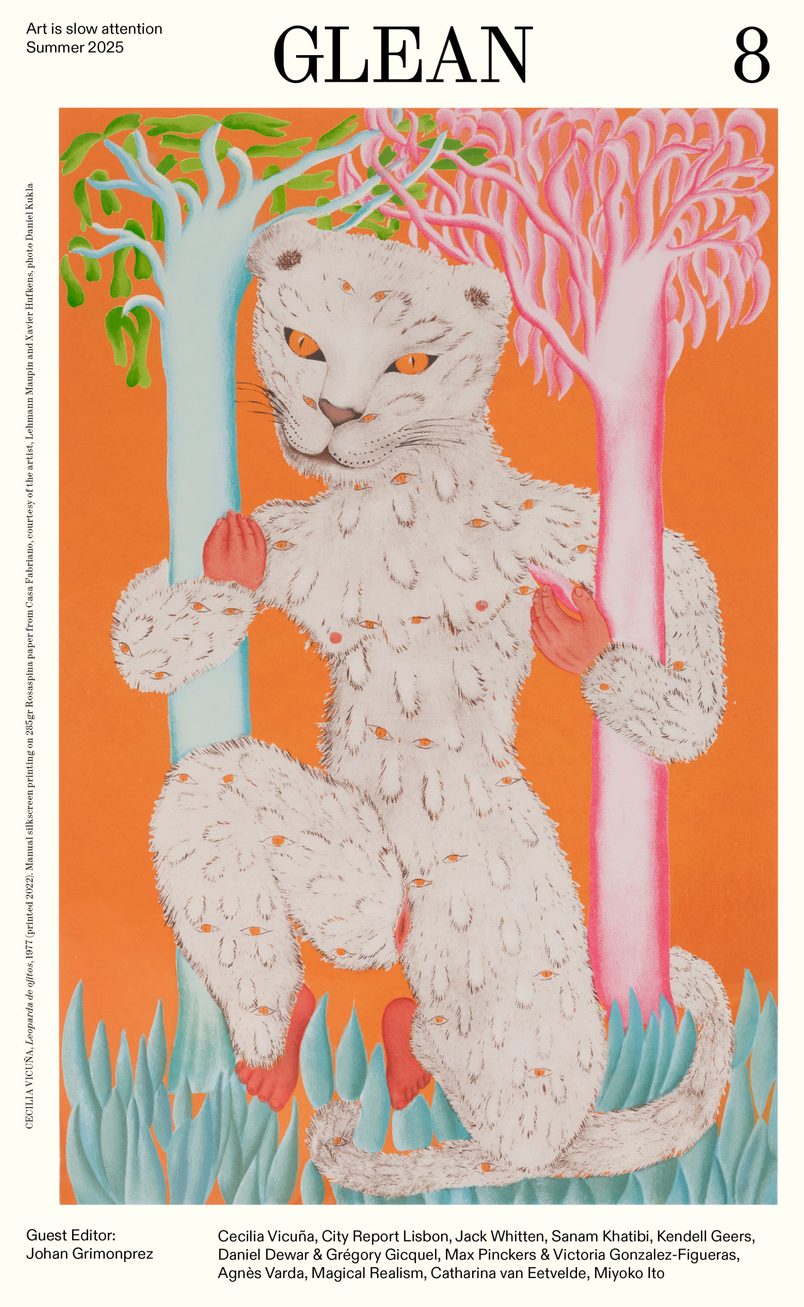
GLEAN 8 - Summer 2025
Contributions by: Cecilia Vicuña, City Report Lisbon, Jack Whitten, Sanam Khatibi, Kendell Geers, Daniel Dewar & Grégory Gicquel, Max Pinckers & Victoria Gonzalez-Figueras, Agnès Varda, Magical Realism, Catharina van Eetvelde, Miyoko Ito.
GLEAN is a Brussels-based magazine for contemporary art with quarterly publications in both English and Dutch.

Sketchbook 1-10
“Sketchbook 1-10” with Antoinette d’Ansembourg bundles a complete collection of pocket sketches created between 2020 and 2023, stretched across ten different notebooks. These sketches, despite their two-dimensionality, form the mainstay of her sculptural output, offering a glimpse into the intimate process behind her stately installations.
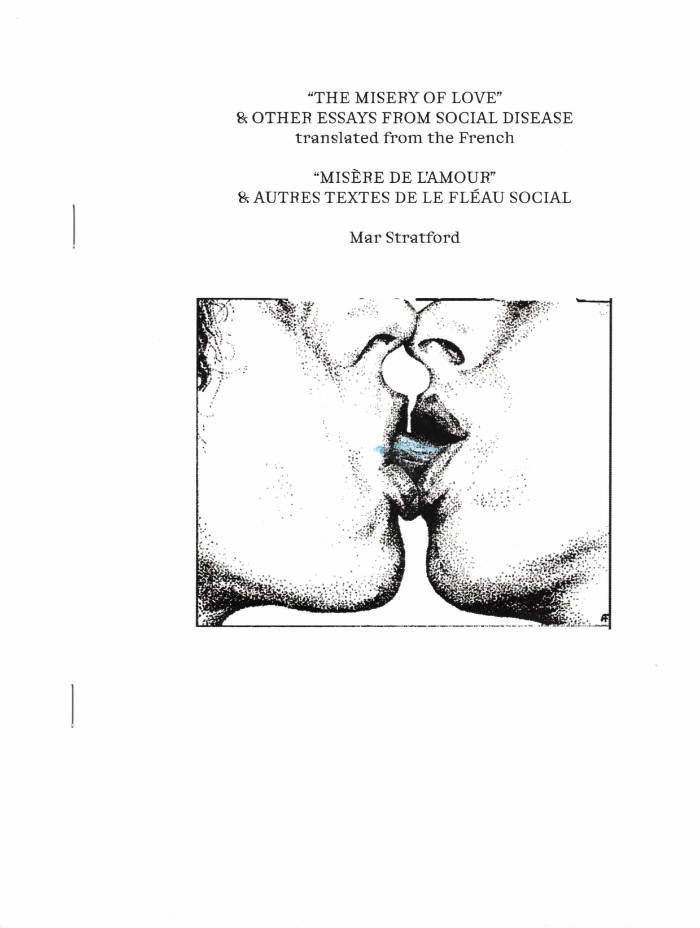
“The Misery of Love” & other essays from 'Social Disease'
From 1972 to 1974, the anonymous writers of Social Disease offered groundbreaking, incisive, and sweeping critiques of social relationships through the lens of Situationism. Arguing that true revolution — the kind of complete and irreversible revolution longed for in the wake of such revolutionary moments as the May 1968 student uprisings and the 1969 Stonewall riots— would change every aspect of society, it was clear that affective relationships — how we love, how we feel pleasure— would necessarily be changed as well, and thus deserved examination as much as the traditional questions of labor or politics. The voices in the essays speak with urgency, and do not compromise in their expression. Beyond the theoretical insights of the text, the emotional truth of history comes through in the spaces of contradiction, and allusions to intercommunity conflicts. These essays were written without constraints for an immediate audience of comrades and peers; with this translation of the collection, that audience now includes us.
"Translating from the French, Mar Stratford's MISERE DU L'AMOUR captures the urgency, passion, and drama of 1970s gay leftism. MISERE DU L'AMOUR asks questions that persist: what does a better world look like? What is the true nature of love? Can we fuck and suck our way to liberation?The questions asked by F.H.A.R in the 1970s have a relevance to today's discourse that Stratford's translation animates. Tell your friends, your lovers, and your haters." —Brendan Williams-Childs
"The Misery of Love" & Other Essays From Social Disease / “Misère de l'amour” & autres textes de le flèau social. Bound with staples. Covers printed on Mohawk off-white cardstock, with front cover image hand colored with pencil and marker. Interiors printed on bright white French text weight paper. Printed and assembled in "Kingston, New York,” the unceded and occupied lands of the Haudenosaunee, Mohican, Munsee Lenape, and Schaghticoke tribes.
Designed by The Aliens.
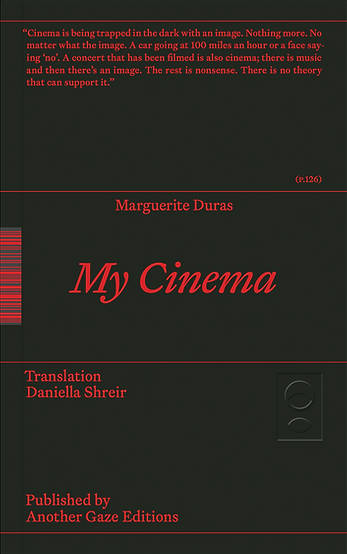
My Cinema
A collection of writings by and interviews with Duras about her filmmaking, first published in French by P.O.L. in 2021 and translated into English by Daniella Shreir.
Working chronologically through her nineteen films, made between 1966 and 1985, this collection of reflections by Marguerite Duras (1914–1996) includes non-standard press releases, notes to her actors, letters to funders, short essays on themes as provocatively capacious as ‘mothers’ and ‘witches’, as well as some of the most significant interviews she gave about her cinematic and writing practices (with filmmakers and critics including Jacques Rivette, Caroline Champetier and Jean Narboni).
In Duras's hands, all of these forms turn into a strange, gnomic literature in which the boundary between word and image becomes increasingly blurred and the paradox of creating a cinema that seeks ‘to destroy the cinema’ finds its most potent expression.
Yet, Duras is never concerned only with her own work, or even with the broader project of making cinema: her preoccupations are global, and the global crucially informs her perceptions of the way in which she works. With the audiovisual as a starting point, her encyclopaedic associative powers bring readers into contact with subjects as diverse as the French Communist Party, hippies, Jews, revolutionary love, madness and freedom, across four decades of an oeuvre that is always in simultaneous dialogue with the contemporary moment and world history.
MARGUERITE DURAS (1914–1996) published over forty novels, numerous essays, novellas and plays and made nineteen films. She was part of the French Resistance, joined then left the Communist Party, and actively protested against the war in Algeria. She collaborated repeatedly with actors including Jeanne Moreau, Delphine Seyrig and Gerard Depardieu. Her films speak of her childhood in Indochina and the French colonies, of desire (burning and frustrated), madness and domesticity. Contemporary filmmakers including Claire Denis, Alice Diop and John Waters have cited Duras’ cinema as inspiration for their own work.

Zona Festival
This book traces the legacy of Zona, Eastern Europe performance art festival that took place in Timișoara, Romania, between 1993 and 2002, years which were marked by a transition from communism to a new society built on different principles.
Bringing together artists from the former "Eastern Bloc," Zona became a space of encounters, a platform for theoretical discussions and postmodern art experiments, which displayed a remarkable diversity of artistic languages. The fall of the Berlin Wall, as Nicolas Bourriaud noted in his book "The Radicant", was the first decisive step towards globalization and the generalization of postmodern thought.
In the early 1990s, adopting subversive strategies helped artists overcome critical moments in totalitarian societies, which had been consolidated for decades in Eastern Europe. They combined techniques of expression such as pastiche, quotes, historical images, popular culture, or subcultures with personal mythologies. What resulted was often a critical mixture with an explosive effect. Body art became an appropriate language for critically analyzing stereotypes about the nation, religion, gender, or social prejudices and taboos. Body art facilitated the transfer of ideas and a dialogue with the audience, or it helped launch questions about identity politics. The concerns and intentions of the festival's protagonists were built around political, social, and artistic topics that were debated between the East and the West.
Essays by Ileana Pintilie, László Beke, Vladimir Bulat, Robert Fleck, Alexandra Titu, Berislav Valušek; artists' texts by Alexandru Antik, Matei Bejenaru, Ștefan Bertalan, Geta Brătescu, Oskar Dawicki, Ion Grigorescu, H.arta Group, Karen Kipphoff, Liliana Mericioiu, Dan Perjovschi, Lia Perjovschi, Sorin Vreme.

Nachbilder / Reflection pictures
Caravaggio’s Head of Medusa, 1596/97, painted in two versions, not only reflects light but is a painted reflection. Similarly, these photographs are all reflections in plate glass mirror. They document a relation in the present without content.
First edition of 50

the she
‘the she’ compares texts by Virginia Woolf with their French translation, reproducing parts of the novelles ‘The String Quartet' & ‘Blue and Green’ and the novel ‘The Years’. Of the novellas, she kept only the articles the in English and le, la, les in French, exactly as they appear in the editions. Of the novel, only the pronouns she in English and elle in French remain.
The publication includes identical two booklets, one bound and one unbound, both uncut, referring to old books which were often sold bound but uncut.
Offset printing. Printed by Cultura, Wetteren
Edition of 123 numbered copies

KAMERA CAHIER N° 10
A special edition issue curated, designed and published by AVARIE, Paris and Labor Neunzehn, Berlin. It accompanies KAMERA SERIES, while it is an independent and valuable object to collect. The central idea that informs and directs the booklets’ montage is the interplay between the concepts of addition and subtraction. This is achieved by unveiling a missing image in the screening or an unreleased second from an artist's film, expanded to 24 pages. Additionally, each booklet contains a piece directly removed from the show.
The editing establishes a dialogue between film frames and performed writings derived from texts, scripts, storyboards, and notes. The KAMERA exhibition is consequently extended into a physical space—the book—allowing for its widespread dissemination, complementing and contrasting with its potential online occurrence.
KAMERA SERIES is a screening program of experimental films, video art works and printed matter taking place in a former GDR building in Berlin. Each event showcases a retrospective of selected films by an artist and a small exhibition of his/her publications or works on paper over a span of 4 days.
KAMERA centers on fostering a critical dialogue between different film formats and artists’ books. Through its regular occurrence, it aspires to create a space for community exchanges about contemporary image-making. KAMERA is a series conceived and curated by Labor Neunzehn and AVARIE.
Fascinated by the intersection of visual art and cinema, Helga Fanderl’s short poetic films evoke intense and sensitive experiences of the real world. Using a small hand-held super 8 camera, she creates filmic responses to her perceptions, weaving together imagery and emotions in dense, rhythmic patterns solely through in-camera editing. She presents silent films in the form of ‘compositions’, crafting unique programs for site-specific personal projections and transforming spaces into temporary cinemas.

An Archive of Feelings
In this bold new work of cultural criticism, Ann Cvetkovich develops a queer approach to trauma. She argues for the importance of recognizing—and archiving—accounts of trauma that belong as much to the ordinary and everyday as to the domain of catastrophe. An Archive of Feelings contends that the field of trauma studies, limited by too strict a division between the public and the private, has overlooked the experiences of women and queers. Rejecting the pathologizing understandings of trauma that permeate medical and clinical discourses on the subject, Cvetkovich develops instead a sex-positive approach missing even from most feminist work on trauma. She challenges the field to engage more fully with sexual trauma and the wide range of feelings in its vicinity, including those associated with butch-femme sex and aids activism and caretaking.
An Archive of Feelings brings together oral histories from lesbian activists involved in act up/New York; readings of literature by Dorothy Allison, Leslie Feinberg, Cherríe Moraga, and Shani Mootoo; videos by Jean Carlomusto and Pratibha Parmar; and performances by Lisa Kron, Carmelita Tropicana, and the bands Le Tigre and Tribe 8. Cvetkovich reveals how activism, performance, and literature give rise to public cultures that work through trauma and transform the conditions producing it. By looking closely at connections between sexuality, trauma, and the creation of lesbian public cultures, Cvetkovich makes those experiences that have been pushed to the peripheries of trauma culture the defining principles of a new construction of sexual trauma—one in which trauma catalyzes the creation of cultural archives and political communities.

Fanta For The Ghosts
fanta for the ghosts by Elisabeth Molin
2021, English
46 pages, 120mm x 210mm
edition of 500
Co-published with OneThousandBooks and Elisabeth Molin